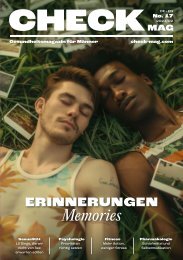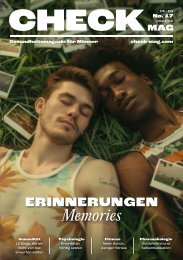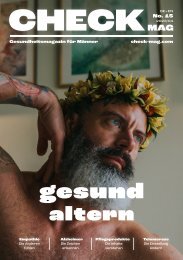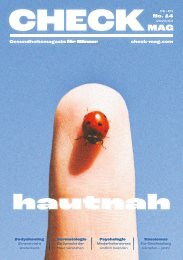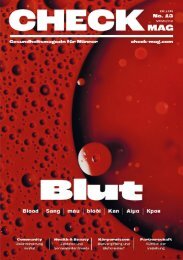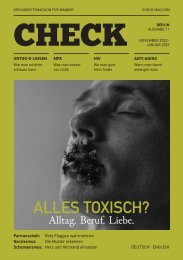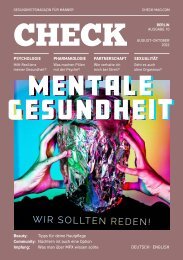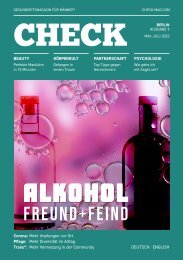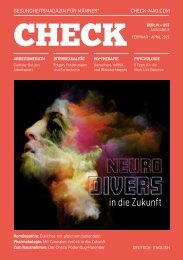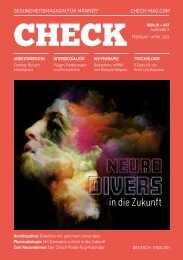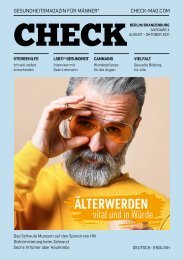CHECK Magazin - Gesundheitsmagazin für Männer No.4
Die Verschmutzung des Planeten findet aber auch im Kleinen statt und betrifft uns ganz direkt. Denn täglich nehmen wir unzählige Gifte durch die Nahrung, Kosmetik oder Alltagsgegenstände in uns auf. Welches sind die größten Gefahren und wie kann man sich im Alltag davor schützen?
Die Verschmutzung des Planeten findet aber auch im Kleinen statt und betrifft uns ganz direkt. Denn täglich nehmen wir unzählige Gifte durch die Nahrung, Kosmetik oder Alltagsgegenstände in uns auf. Welches sind die größten Gefahren und wie kann man sich im Alltag davor schützen?
Erfolgreiche ePaper selbst erstellen
Machen Sie aus Ihren PDF Publikationen ein blätterbares Flipbook mit unserer einzigartigen Google optimierten e-Paper Software.
COMMUNITY<br />
ENGLISH<br />
INCIDENTALLY, RACIST<br />
After the #blacklivesmatter protests around the global last year, no<br />
one can say that the discussion about racism isn’t important. But why<br />
is our community walking on eggshells around the topic?<br />
RACISM IN THE COMMUNITY<br />
Queer Matters e.V. organizes roundtables<br />
in which current topics from the areas of<br />
health, culture and community are addressed.<br />
As the #blacklivesmatter continued to<br />
grow in prominence, the team, based in the<br />
community center Village Berlin, decided to<br />
conduct a survey. They wanted to find out<br />
whether members of the community had<br />
experienced racisms, and, if so, how? The<br />
questionnaire specifically addressed members<br />
of the Village Berlin community and not<br />
the queer community in general. While the<br />
results of the survey are still being assessed,<br />
we were able to chat with project manager<br />
Thomas Schallhart. After viewing initial<br />
results from the survey, he confirms that<br />
racism and racist experiences are very much<br />
part of LGBTQI* people’s lived experiences.<br />
How can it be that there are such unhealthy<br />
inhumane tendencies in a community that<br />
experiences discrimination itself again and<br />
again?<br />
HOW DO PEOPLE BECOME A RACIST?<br />
A racist is someone who behaves differently<br />
towards people because they have a different<br />
skin color, heritage or culture. Some people<br />
even believe that because of such differences,<br />
they are something better. Thomas<br />
Schallhart describes a fundamental problem<br />
with racism that we were racially socialized<br />
in a white society: „We are constantly being<br />
told, directly and indirectly, that black people<br />
and people of color are less valuable than<br />
white people.“ But a lot of racism also comes<br />
from history. “For centuries, white Europeans<br />
have exploited, enslaved and oppressed much<br />
of the world. An important mechanism was<br />
to classify European culture as ‚normal‘ and<br />
anything else as different and of less value.“<br />
UNCONSCIOUS AND CONSCIOUS<br />
RACISM<br />
Social researchers in the field speak of conscious<br />
and unconscious racism. The difference<br />
lies in whether the person can assess the consequences<br />
of what they said. Certain AfD politicians<br />
(the far-right Alternative <strong>für</strong> Deutschland<br />
party), for example, consciously say<br />
racist things in order to get votes from people<br />
who are either consciously or unconsciously<br />
racist themselves. Unconscious racism is not<br />
always that easy to determine, but basically<br />
begins with dividing people into a collective<br />
and assigning them certain characteristics.<br />
The statement „All Arabs are anti-gay“ is a<br />
good example. If you hear such statements<br />
more often, the probability is higher that you<br />
internalize this view. The next time you meet<br />
a woman with a headscarf, you unconsciously<br />
act negatively because you think she is anti-gay.<br />
This negative behavior is already racist,<br />
whether it is consciously or unconsciously.<br />
ANYONE WHO REMAINS SILENT<br />
BECOMES COMPLICIT<br />
In addition to racist socialization, we were<br />
taught another problem: silence. Many people<br />
know the situation when Grandpa Karl uses<br />
racist terms or the strange colleague from the<br />
sales department scolds foreigners. Nobody<br />
dares intervene and if they do, the person<br />
quickly becomes the defensive and digs in their<br />
heels. Tolerating racist statements doesn‘t<br />
make you a racist per se, but it does contribute<br />
to the fact that racism can develop freely. The<br />
study by Queer Matters e.V. also shows that<br />
there is a problem with how criticism of racism<br />
is dealt with. However, Thomas Schallhart sees<br />
a lot of potential here to effectively combat racism,<br />
“It doesn‘t do much to simply observe the<br />
8 <strong>CHECK</strong> | AUSGABE 4




